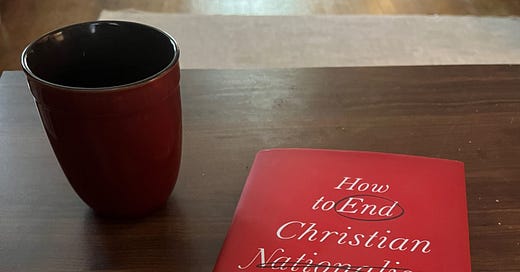Book Review: How to End Christian Nationalism
by Rev. Erin Jones, Communications and Advocacy Engagement Manager
Earlier this month I was leading a workshop for youth and young adults to learn about faith-based advocacy, where those gathered shared the injustices they saw in the world - anything from growing wealth inequality to lack of healthcare to animal abuse to homelessness. One teen raised his hand and said, “I’m also really concerned about the way some people use Jesus to justify a lot of that.”
I was very glad I had just finished reading Amanda Tyler’s How to End Christian Nationalism, because I felt better equipped to give that group of teens a vocabulary and tools to understand this big thing that they had so keenly noticed - there are forces who use the “veneer of Christianity to advance its own aims,” namely the consolidation of power among a small number of adherents to a harmful political ideology.
The term “Christian Nationalism” has gained notoriety over the last few years, especially in the wake of the January 6 insurrection of 2021, where the language and symbols of Christian Nationalism “played a vital role in leading up to the siege and provided a unifying ideology for many disparate groups that day.” Tyler’s book helps distill the ways in which Christian Nationalism distorts the symbols and heritage of both Christianity and the United States, using them to justify political violence, racism, and xenophobia in our public discourse.
One refrain I have heard as I’ve taught and engaged about the intersection of faith and public life has been a disheartened resignation from many that Christian Nationalism feels too big, too rooted in our systems, to properly confront or counter. Even a number of documentaries that have been produced the past few years do a good job of detailing the rise of Christian Nationalism over the past few decades, but leave the viewer wondering, “so what do we do now?!”
Tyler offers the foundation for answering that question. She outlines eight “steps” for ending Christian Nationalism, though she recognizes that there is actually no easy checklist. Instead, the work of disentangling Christian Nationalism from our public systems will involve repentance, education, and community building. We will have to lean in to denouncing violence, building understanding across political and religious divides, and deeply listen to one another - especially communities that are most affected by the harmful policies and ideology of Christian Nationalism.
Tyler is careful to call out the large systemic force of Christian Nationalism, rather than make the critique about individual Christian Nationalists, reminding the reader such definitive labels are counterproductive and “we are better served by thinking of these as systemic problems that we can learn to recognize and the work to disengage from ourselves as we work with our communities to reject them.” In this commitment, I felt a resonance with Jesus’ call to take care of the log in our own eyes before pointing out the specks in others - a humbling reminder that the ways of Christian Nationalism are not just in those people who feel fully other, but are rather embedded in the systems I, too, perpetuate. Tyler’s book reminds us that the work to end Christian Nationalism is first and foremost, deeply internal and spiritual work.
This book is written in an easily accessible way that would make it ideal for book groups or congregational study. Each chapter ends with a piece of scripture and a “Reflect and Act” prompt for group discussion. Tyler makes the big task digestible with these steps that hold the potential for making ripples of change in a community that takes the call to action seriously.
This book is only the first step though, and for congregations who have already been in the trenches of dismantling Christian Nationalism and engaging in antiracism, it might feel rudimentary. And yet, Tyler’s stories, expertise, and commitment to the belief that “white Christians bear the most responsibility to end [Christian Nationalism] because we have benefited the most from it and done the most to perpetuate it” will offer a voice of encouragement and solidarity in that work. For those communities who are newer to these discussions, it is an approachable introduction that will challenge and inspire.
I’m excited to hear Tyler speak at our event in March, and I hope you can join us (in person or streaming!). We’ll have copies of the book available for purchase and signing too. I hope she expands on what she offers here, giving more resources from our spiritual and historical traditions about the work ahead of us in confronting Christian Nationalism. The combination of her work with Dr. Lori Brandt Hale’s scholarship with the theology and legacy of Dietrich Bonhoeffer should give us all new and actionable insights as we move forward in this work. I’m eager to hear more of Tyler’s stories of the ways in which building relationships and centering ourselves in the actual Gospel of Jesus can offer an alternative path forward, and a compelling constructive vision for the world we want to live in, together.





